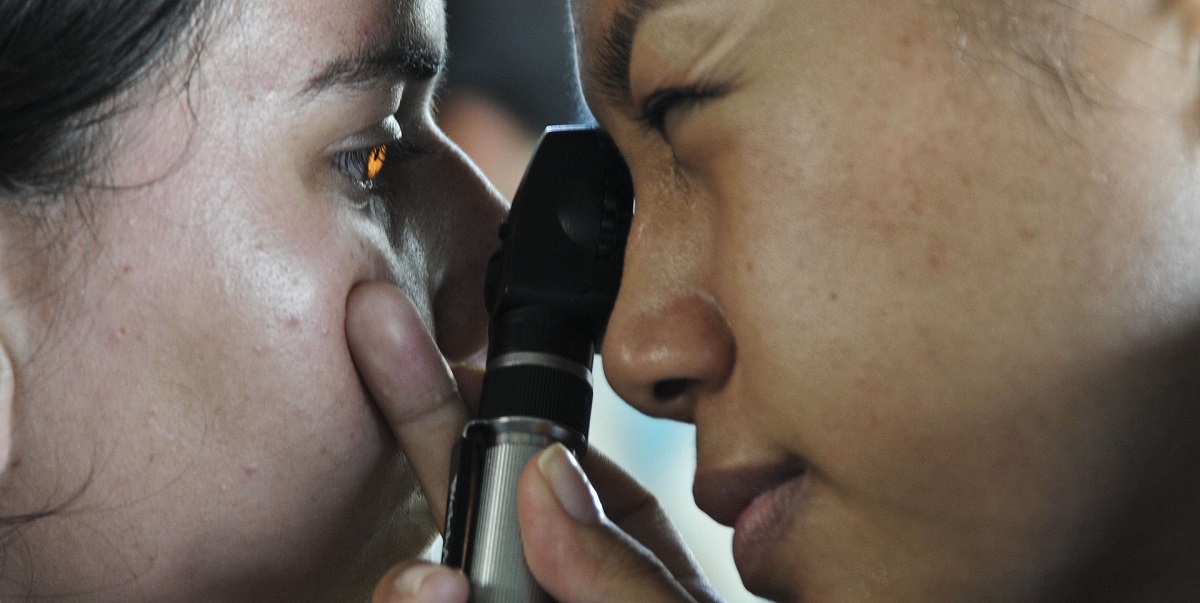Eye test
Some brain tumours can be detected through an eye test. But, it depends on the type of tumour and where it is. It’s also good to remember that brain tumours are relatively rare and vision problems can be caused by a lot of different factors.
Changes in vision are symptoms of brain tumours. So, if you have problems with your eyes or vision, you may visit your local optician for an eye test. Your GP may also refer you to an optician to review any symptoms you may be experiencing.
Most people should have their eyes examined every two years (or every year for children under the age of 16). You may be advised to have an exam more often depending on your age and general/eye health. These can be arranged at your local opticians, and the NHS gives some people a free eye test for a number of reasons.
If you experience problems with your eyes or notice changes, you should book an eye test with your optician. It’s understandable to be nervous if you’re having trouble with your sight. But, remember that brain tumours are relatively rare and the majority of vision issues are not due to brain tumours. However, if one is detected, you will be able to get a referral and begin treatment as early as possible.
On this page, we’ll cover everything you need to know about eye tests and brain tumours. You’ll find:
Get support
If you would like more information or just a listening ear, the members of our kind and approachable Support Team are here for you.
Get your free Information Pack
Our Brain Tumour Information Pack can help you better understand your diagnosis and feel confident talking to your medical team.
Talking to your doctor
Learn more about how to approach your GP.
Can an eye test detect a brain tumour?
Yes, eye tests can sometimes detect brain tumours. In fact, they can even spot brain tumours before there are any noticeable symptoms, making routine eye tests a good choice if possible.
During an eye test, an optician can identify a brain tumour by either noticing a swelling of the optic disc or seeing pressure on the optic nerve. Both of these can cause changes in vision.
But, it’s important to remember that eye tests can’t always identify brain tumours. It depends on the type of tumour and where it is in the brain. Still, they are often helpful.
Problems related to brain tumours may include:
- Abnormal eye movements (including a newly acquired turn in the eye)
- Persistent/recurrent headache
- Suspected loss of vision
- Abnormal head position such as wry neck, head tilt or stiff neck
- Blurred or double vision and loss of vision.

Preparing for your eye test
The eye test appointment will probably be fairly short, and it can help to be aware of this so that you can provide the optician with the relevant information. Below are some tips that may be helpful:
- You may like to write a list of any medication you or your child takes. You can refer to this in your appointment or show the optician
- You may want to bring any previous glasses prescriptions for you or your child
- You may want to bring any written documents for any eye health problems you or your child have had in the past
- Try to think back to when you or your child first noticed changes or symptoms and if they have changed or worsened since then
- Keep a diary of any symptoms you may have up until your eye test.
During your appointment
The optician will want to examine you or your child. The optician will usually:
- Check your vision
- Assess the movements of your eye muscles
- Examine the internal and external eye
- Provide you with a spectacle prescription
They may perform extra tests if they feel it is necessary.
Depending on the optician’s findings during your appointment, the outcomes could be:
- 1. Reassurance that you or your child do not have any brain tumour signs that require an urgent referral. The optician should explain his or her reasons for this reassurance. They may refer you or your child to an eye specialist or a GP if they think there may be a different condition that needs investigating.
- You may be referred to a hospital eye department or A&E for other urgent tests. This may be due to a suspicion of a brain tumour or other possible causes.
- For non-urgent further investigation by an eye specialist, you might be sent to the GP for a referral or to a specialist eye department.
- If the optician believes there is an issue which is not related to the eye, he or she may ask you to see your GP.
At the end of the appointment, make sure you know what’s next. For example:
- If you are expecting to be contacted – when and by who?
- If you need to make another appointment, when should this be?
After your eye test
Follow the next steps discussed with the optician. If you don’t hear from your optician or eye specialist within the timeframe you expected to, contact them to follow this up.
Continue to keep a watchful eye on your symptoms. If there are any major changes, phone the optician or, if they are closed, visit A&E.
Support and Information Services
Research & Clinical Trials Information
You can also join our active online community.
In this section

Get support
If you need someone to talk to or advice on where to get help, our Support and Information team is available by phone, email or live-chat.
Recommended reading
Share your experiences and help create change
By taking part in our Improving Brain Tumour Care surveys and sharing your experiences, you can help us improve treatment and care for everyone affected by a brain tumour.